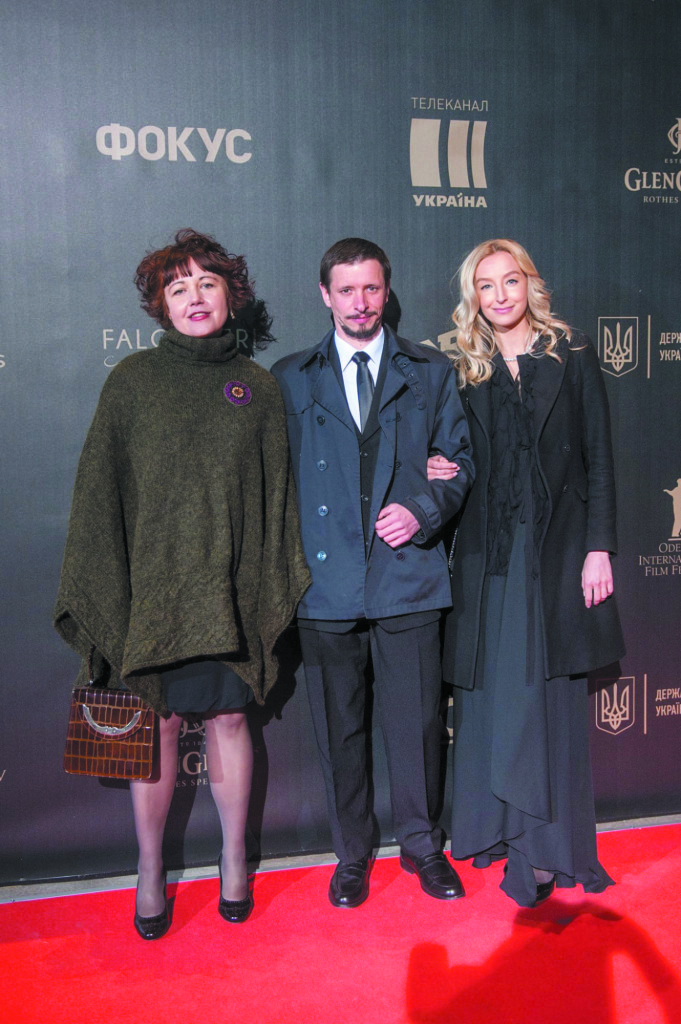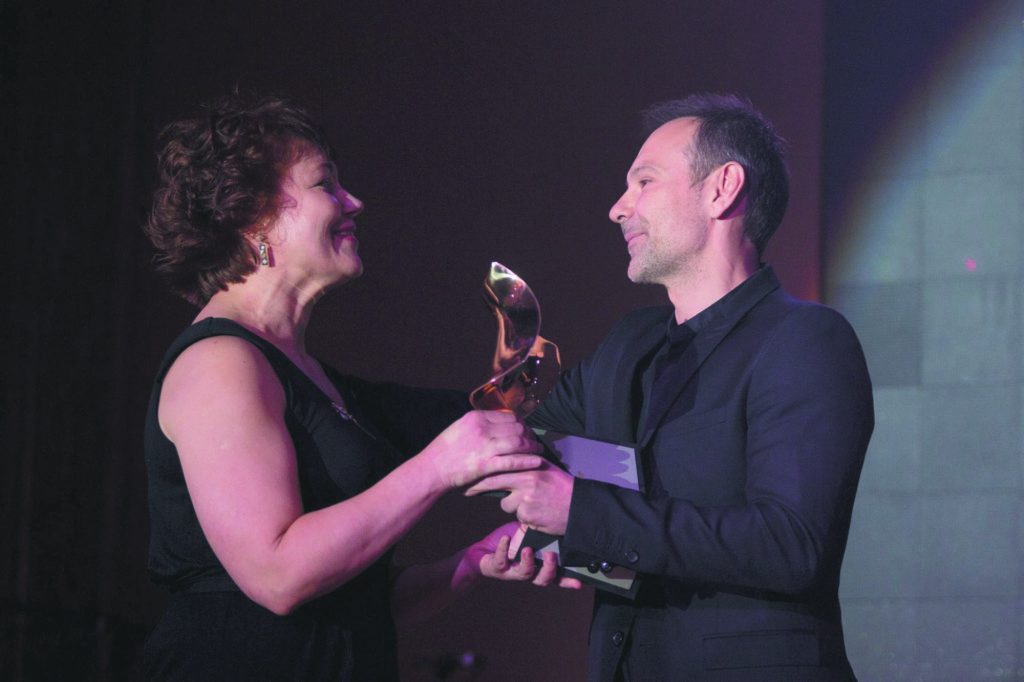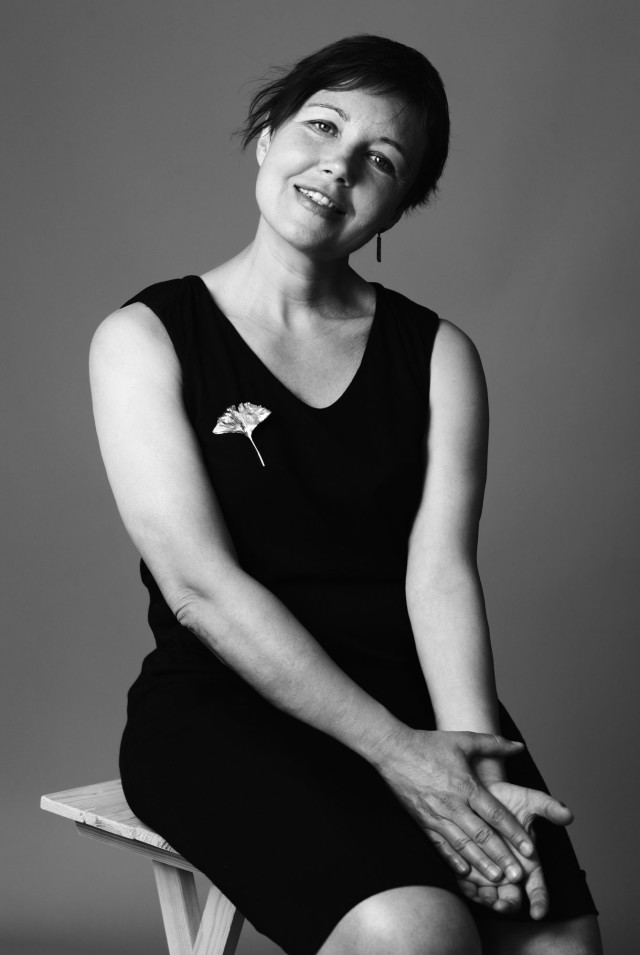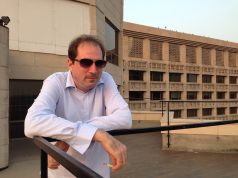The composer Alla Zagaykevych is a real character. Her work in film is not the main arena in which Ukrainian composer Alla Zagaykevych flexes her creative muscle. She is more known for her orchestral pieces which are played across Europe. But fate had it so that every other soundtrack created by Zagaykevych would find itself being of an iconic Ukrainian film – “Mamay”, “Povodyr” and “Zhiva Vatra”. Her music for “Zhiva Vatra” even earned her the prestigious Ukrainian Film Academy award, “Zolota Dziga” in April of 2017.
Zagaykevych’s interviews are always impressive. Reading them, one feels dwarfed by her understanding of music, which is why at the very start of my meeting with her, I decided to admit that I was afraid of her. It is easy to sound silly, uninformed, vapid in comparison to her. Upon hearing my confession, Zagaykevych looked at me with a certain softness and mild confusion in her eyes and put me at ease: “I get a little scared myself when I see my interviews. I read them and think: could I really have said that??”
My fear suddenly evaporated.
Zagaykevych’s relationship with cinema began back in the 1990’s but the films of that era which feature her soundtracks are unfortunately hard to track down today. For complex reasons, Nelya Pasychnik, the director of these movies, does not allow her works to be reproduced or in fact, shown at all. Some of the films on which Zagaykevych worked on in the 21st century, including those made by the film maker Oles Sanin, however, are front and center in the public eye. These include “Mamay” (2003)” and “Povodyr (The Guide)”. Last year’s “Zhiva Vatra” was one of the most important Ukrainian films of the last few years and the soundtrack to that film brought Zagaykevych the title of the top Ukrainian soundtrack composer at the “Zolota Dziga” awards held last spring in Kyiv. From past to present – this was the trajectory of our conversation.
“Mamay”
I attempted to guess which one of Oles Sanin’s films Zagaykevych considers to be her favorite. My guess was that it was “Mamay”. I guessed correctly based on her reaction. Zagaykevych recalled working on that film with great pleasure: “that film had a wonderful team working on it. We had an atmosphere of incredible trust towards each other. An atmosphere of total freedom during the process. Even my harsh, electronic creative decisions with the music did not meet with any resistance”.
In “Mamay”, most of the action took place as if within a dream, behind a smoky oneiric veil. This dreamlike cadences of “Mamay” afforded Zagaykevych a great deal of creative freedom as composer – she could experiment as much as she desired. She enjoyed wielding her massive knowledge of Ukrainian folklore while working on the film. Most important of Zagaykevych explains is that while working on “Mamay” she learned the importance of having the director treat her as his equal.
“Sanin showed me the material and asked, ‘Could you find something within a week? We’re showing it soon at the House of Film. ‘I responded honestly, ‘I don’t know’. I took the videotape and went home. [Sanin] calculated exactly the time it would take me to get home, watch the film and added about five-ten more minutes after that. At which moment exactly, I got his call. ‘Well, did you watch it? What do you think?’” – Zagaykevych remembers with a smile.
For her, this is extremely important – knowing that her opinion truly matters to the director she is working with. “That is when I really feel that we are creating something together” she explains. In the case of “Mamay”, she did come up with most of the needed music within a week, just as Sanin had asked of her. Zagaykevych worked from morning until night, both in the conservatory and at her computer. Of course, after the raw material was created, it was smoothed out, worked on and brought to completion over the course of a single year. But the foundation of the work was laid over those few days.
It was not the same with every film that she worked on. Far from it. “I only experienced this powerful a feeling of co-creation one more time after “Mamay”, while working on “Zhiva Vatra” – says Zagaykevych.

‘Second-Hand”
Zagaykevych excitedly retold me the plot of ‘Second-hand”, the mystery thriller shot by Yaroslav Lupiy and released in 2004. The film is elusive, but can be found if one puts in a bit of effort online. “I was enthralled by the script which was at a Hollywood-level. The chain linking the crimes, the killer who was some kind of oligarch – nearly the mayor of the city. The script had it all – social tension, fantasy, lyricism. It was a story about the provocations of people who love to play strange games. Provocations aimed at a mentally ill person. But the viewer does not know he is mentally ill – this becomes apparent only by the end of the film”.
Unfortunately, Zagaykevych does not consider the music that she created for that film to be among her best work. The result ended up being very different from the initial script and not in a way that made her comfortable. The music was meant to emphasize the mystical nature of the events, hint at the hidden madness of the main character who followed mysterious signs without realizing he was being watched. “The wonderful script was not done justice. My music did not reach its full potential in the film – it did not have anything to support” she sums up ruefully.
At this point our conversation reaches the obvious question – is a composer who creates melodic soundtracks on demand really free in any sense? After all, she is working within commissioned guidelines and working to meet the desires of the director and the producer. Any and inspiration and unbridled creativity find themselves in second. Zagaykevych has no qualms with this – she sees working in film as an opportunity to approach her art from another angle. A new experience, a new way to look at her surroundings and herself.
“I am one of those composers who has real respect for soundtracks. For example, Valentin Silvestrov, when he is offered to work in film, says: ‘I have already composed enough music. If you like something, use it.’ I see those offers as an opportunity to do something different, like a musician who today plays Bach, tomorrow – Brahms, and someone else the day after that. I am interested in trying things I have never done before. There is a special kind of freedom in that. Creating is always associated with freedom.”
On paper, these words seem filled with pathos – but Zagaykevych delivers them calmly, in an everyday tone. It is obvious that for her, these are not just pretty quotes – they bear immense meaning. However, as every conception of freedom has limits, one type of constraint that soundtrack composers often meet with is “reference music” – that is music which is already composed by someone else, often already well-known, which the director envisions as the inspiration for their film’s soundtrack. In these cases, the director will approach the composer demanding that they create something similar to a well known tune. Understandably, Zagaykevych admits that she finds such cases difficult: “I feel like Count Esterhazy’s composer: ‘For the first course of the dinner I need this kind of melody, for the second course ’ and so on. Composers who worked in the courts of nobility were very limited in their creative freedom. Bach was obligated to compose a new cantata each week.”
At the same time, Zagaykevych admits that there is something reasonable about that approach – it helps streamline the composing process. It is no coincidence that the American film industry often uses this approach when creating soundtracks. Zagaykevich experienced this during another collaboration with Sanin, on a Ukrainian-American made documentary about the 2013-2014 events of the Kyiv Maidan revolution. She had to deal with integrating “reference music” in working on the Maidan project – her references included the works of such greats as Philip Glass, Arvo Pärt, and Erik Satie. The producers told her: “If you cannot come up with music like that, we will use it instead of yours”. Zagaykevych recalls: “My task was, in essence, to create something new out of what already existed. It was a nightmare. Everything had to be reworked three or four times. At the end, it all worked out – but the process was excruciating”.
“Povodyr (The Guide)”
In yet another one of Sanin’s films (this one was an Oscar nominee), Zagaykevych got the opportunity to perform several creative roles at once. The film’s soundtrack consisted of different genres – symphonic, jazz, and folk. Zagaykevych had a hand in creating each one of these distinct sounds.
“One of my friends in Crimea has a big-band. They’re not professionals – they just create jazz the best they can and they play very harshly – like the musicians who were first approaching this kind of material did in the 1930’s. I suggested that we use his music. But the creators of the movie decided that everything should be done smoothly, seamlessly, cleanly. In my opinion, my idea was better – but we did not end up using it and I took it in stride.” Zagaykevych still composed all the jazz numbers in the film except for one.
It was less difficult when it came to the folk music. “Povodyr” has several episodes in which Ukrainian bandurists play traditional music. On the screen it all looks very traditional, but was it that way in reality? Zagaykevych explains: “Today, playing music on banduras and kobzas is not just folklore, it is the professional musical aspect of oral tradition. The tradition was interrupted – although it was still alive in the 1920’s and even during the 1930’s. We are very lucky to have made contact with the composer and musician Julian Kytasty, whose father escaped to America with a group of those bandurists. The people who escaped during those times, they were the carriers of a lost tradition.”
The orchestral score in “Povodyr” which was also written by Zagaykevych serves as a refrain – most often it underscores the quiet dramatic moments of the film. These are the moment when the film deals with the repressions faced by the main characters. Those components came together to create the sonic bouquet of the film – which in many ways reflected the historical moment of 1930’s, the era when the film’s events take place. “That time had its own aura of music”, – says Zagaykevych.

“I was amazed by Hans Zimmer”
I inquired of Zagaykevych how important her “Zolotaya Dziga” award is to her, and what awards in general mean. “I think of them as a sort of formality, so I have no special attachment to them. There are many composers who are far more talented than me. For example, Anton Babaykov. For me, I’m just happy than I can do something in the world, other than making music for the sake of making music. But I am not sure that it should be me who is the recipient of the awards.”
Prompted by this show of modesty, I ask Zagaykevych to try to recall the soundtrack of a movie, any movie, which impressed her. Ang Lee’s “Crouching Tiger, Hidden Dragon” comes to her mind first. In that score traditional folk instruments weave their way into the electronic fabric in an unusual manner and it is clear why composer received an Oscar.
Suddenlly, Zagaykevych remembers something which brings a fire into her eyes. She is thinking of a scene from the movie “Twelve Years a Slave”, the score of which was composed by Hans Zimmer. “He amazed me. There is a moment, when the slaves are gathering sugarcane on the plantation. The music had to get across the aggression, the harshness of the events on screen. I was amazed at how he was able to capture this in music. It was amazing the way he worked avant-garde music into it, and how it blended with the natural sounds – it was truly something else! Eduard Artemyev achieved something similar in the films of Andrey Tarkovsky!”
There is a director for whom Zagaykevych wishes she could compose – Derek Jarman, the creator of “Caravaggio” and “The Garden”. “I love his director’s dynamic, his experimental approach (he is known, for example, for attaching his camera to a bicycle wheel). His films are a sincere and insane flow of consciousness. I think it would be fascinating to write music for him.” – Zagaykevych finishes with a sigh. I think understand why immediately – Derek Jarman died in 1994.
Igor Panasov is a music critic based in Kyiv.




































